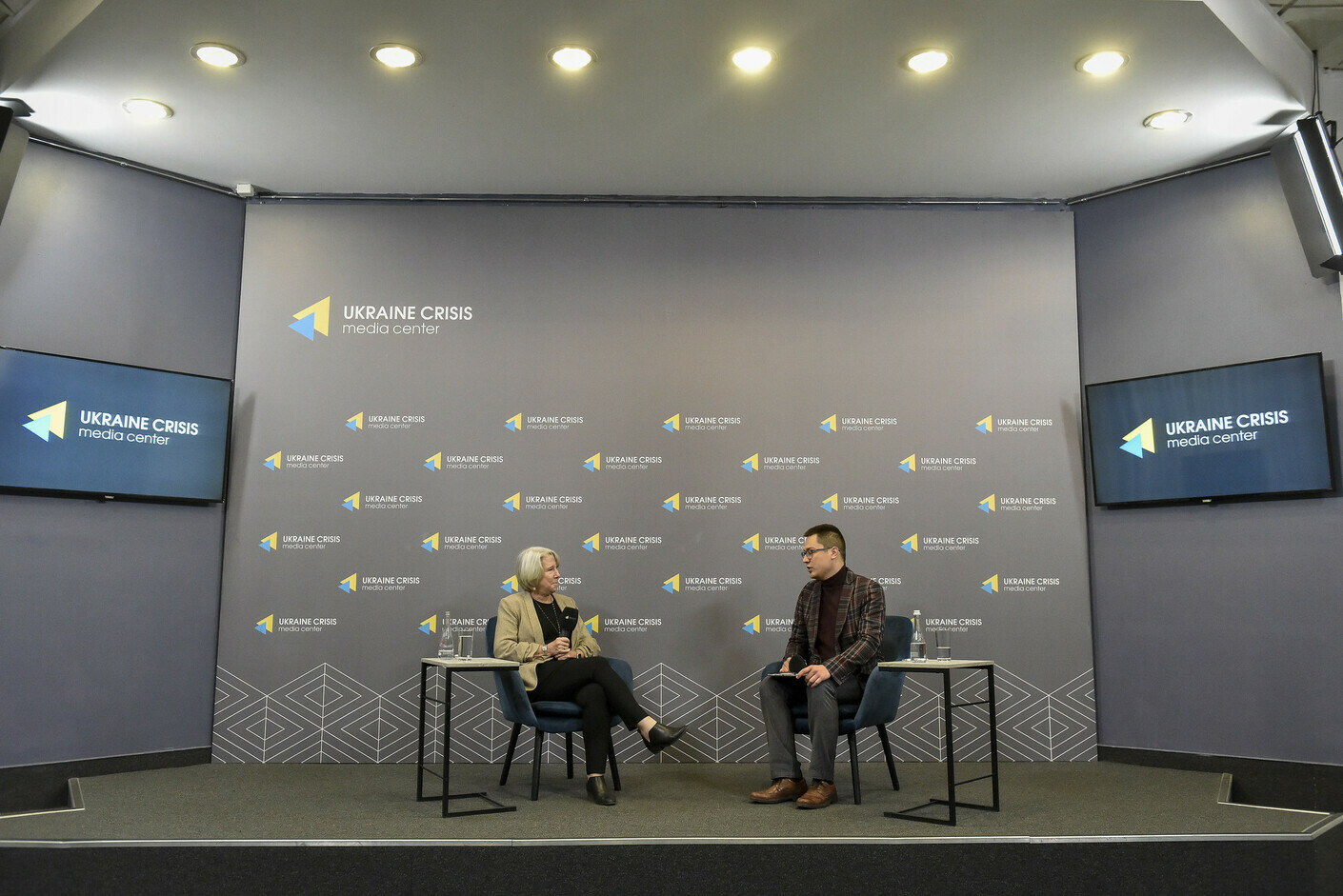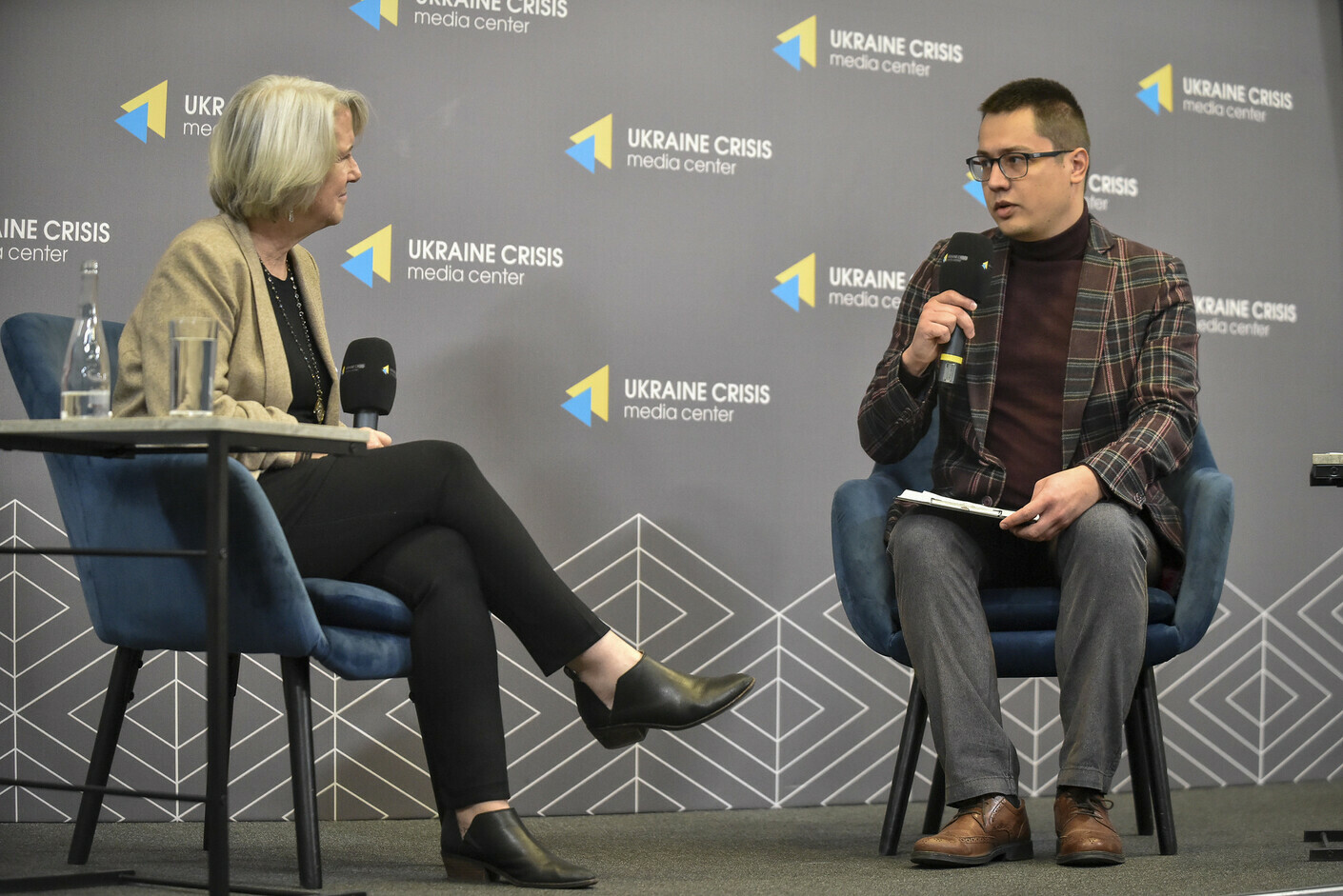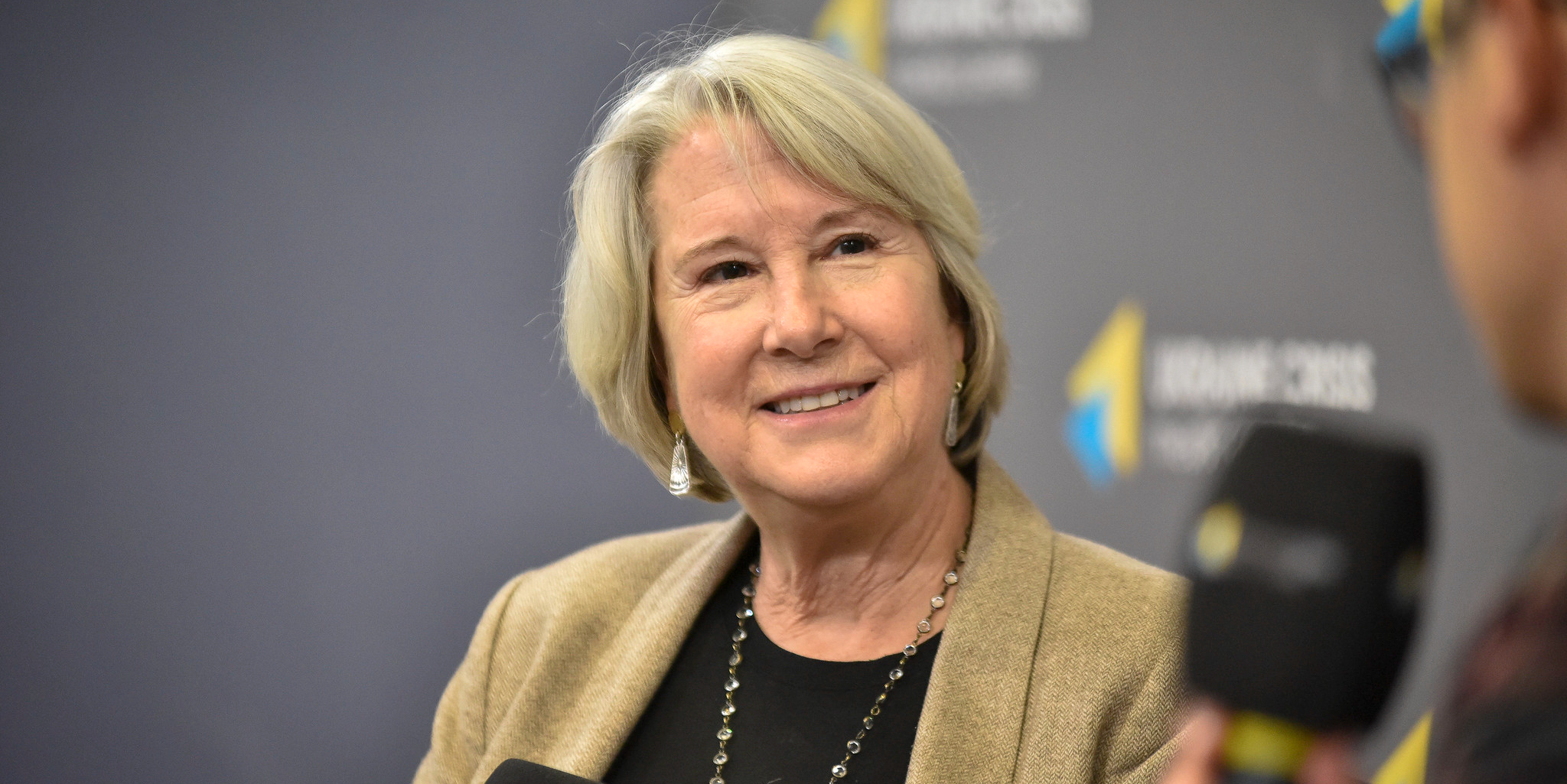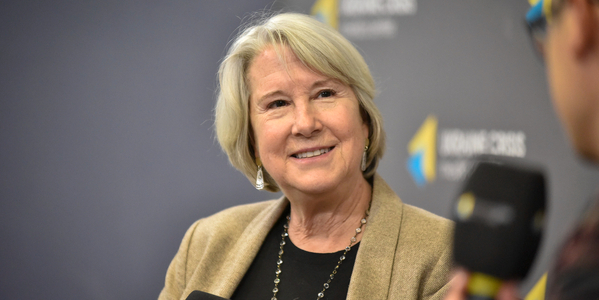Ms. Carrie Hessler-Radelet: We support the Ukrainian people and want to be your partners for as long as possible
Ms. Carrie Hessler-Radelet, President and CEO of Global Communities, was on her sixth visit to Ukraine. What was her first impression of Ukraine during the war? What programs does Global Communities support in Ukraine? What is the principle of international support programs?
Ms. Carrie Hessler-Radelet, President and CEO of Global Communities, spoke about these issues during an interview at the Ukraine Crisis Media Center.
Humanitarian missions in Ukraine are an important element of the post-war reconstruction, restoration, and recovery of Ukraine. Today, independent non-governmental organizations are providing significant assistance to Ukraine and laying the foundation for economic recovery, building the social and political foundations of post-war Ukraine. It is also crucial to provide assistance to Ukraine in terms of strengthening the resilience of our society, as this is the basis for the rear of the Ukrainian army. The international organization Global Communities works with local communities, and this is a great help for Ukraine. Global Communities works with 35 countries, providing substantial support to countries like Ukraine that are dealing with external threats, helping them with humanitarian aid, and promoting sustainable development.
On visits to Ukraine and the first impression of Kyiv during the war
Mr. Volodymyr Solovyan, Senior Analyst at the Ukraine Crisis Media Center: What is the purpose of your current visit and is this your first visit to Ukraine?
Ms. Carrie Hessler-Radelet, President and CEO of the international organization Global Communities: I have known about the Ukraine Crisis Media Center for many years, and it is such a privilege to visit you. This is actually my sixth visit to Ukraine.
My first visit was in 2007, and I came here in my previous career. I worked for a public health organization called John Snow Inc. It was supported by the US Government by USAID, similar to our DOBRE work, and we worked on HIV/AIDS prevention treatment here in Ukraine. Later, I came twice as director of the Peace Corps. In Ukraine, we had our biggest program.
The last time I came was actually only two weeks after Maidan. So that was different. That was a very different time, although, in some ways, there are similarities.
So, I'm really delighted to be back here with Global Communities. This is my first visit as CEO of Global Communities, but we're very proud of the work that we do together, the Ukraine Crisis Media Center and Global Communities, implementing the DOBRE program.
Mr. Volodymyr Solovyan: What are the main changes in Ukraine that you have noticed since your last visit?
Ms. Carrie Hessler-Radelet: I have to say, it is the city of Kyiv that gave me my first impression. I came in on the train, and I walked out of the train station, and the city looks so vibrant, so alive, so modern, so prosperous, really, these are the words that came to my mind. In some ways it's strange because I know that Ukraine is under siege from the Russian aggressor; I know that there is war in this land, in Kyiv though it seems very peaceful and life goes on as normal, but I still hear air raid alerts... I'm also going to Chernihiv, so I'm going to see a different side of it. But I have to say that my impression of Kyiv has been that this is a modern city that continues to be prosperous, to engage with the world, and so I was pleased to see that, at least in Kyiv, the economy seems to be rolling along.
Mr. Volodymyr Solovyan: Yes, it is a part of foreign humanitarian assistance to maintain the peaceful life in large cities in the rear, because it is vital for the Ukrainian economy, obviously.
How Global Communities works in the world and in Ukraine
Mr. Volodymyr Solovyan: And my next question is about your assistance via the DOBRE Program and humanitarian assistance project CLEAR, and also aid to a number of small and medium-sized businesses in Ukraine. Could you talk a bit about Global Communities’ multifaceted approach to assistance to local communities and private enterprises?
Ms. Carrie Hessler-Radelet: As our name implies, we are a global organization, but at the very core of who we are are the communities we serve, the communities that we work on together with the Ukraine Crisis Media Center, the one hundred communities with whom we have been working since 2016 - during the last seven years. We have a deep history with Ukraine. And around the world.
We operate in more than 30 countries around the world, but at the very root of every single thing we do is the community. Our approaches vary from country to country because they are so community-driven. In general, it involves using methodologies that bring the voices of community members to the forefront. We cooperate with the stakeholders, including the national government, but also oblast or district governments, as well as civil society to be able to have a meaningful conversation and develop plans that will then support the development of that community and build resilience.
Our mission statement is that we bring together local ingenuity and global insights to save lives, advance equity and secure strong futures. So the local and global part is the partnership that we have, for example, with the Ukrainian people and the civil society organizations like the Ukraine Crisis Media Center, as well as others, implementing DOBRE. But we also bring some insights from the work that we have done across the globe in more than 30 countries, where we work. Saving lives, advancing equity, and securing strong futures are our three lines of business.
We do three different things that reinforce and leverage one another.
The first is sustainable development. It is really the foundation of our work with DOBRE. It's supporting the Government of Ukraine's commitment to decentralization by providing capacity support to municipalities, to mayors and other officials, as well as working with civil society and, of course, community members to equip them with financial management, strategic and work planning, skills of communication, project implementation management skills, etc., that enable municipalities to carry out their own development plans.
A humanitarian assistance program is what we are pivoting to now. Because of the Russian invasion, we now have a humanitarian crisis and so our team is coming in with support for shelter, dignity kits, multi-purpose cash assistance, generator procurement and sometimes for heavy equipment to remove rubble. So in DOBRE we've had to pivot our program from being a purely sustainable development program, focused on decentralization, to include and layer humanitarian interventions on top.
And then we have actually a for-profit microfinance business, it's called The Vitas Group. It's an independent subsidiary of Global Communities that provides microfinance - lending to small businesses. And so we have this expertise in economic growth, in financial inclusion, that we can bring now to our programs in Ukraine.
We have three projects in Ukraine now. We have the DOBRE project, which is the project we do together. It's a program related to decentralization and the building of resilience, and right now we are supporting the territorial communities' recovery plans. And then we've added the humanitarian component, a project also funded by USAID, which is called CLEAR. Besides that, we have another project called PEARL which is funded by Global Communities, ourselves. We saw the need for economic growth and recovery in communities we serve. We just came from a media training that your organization (editor's note - UCMC) is doing, with mayors from across your nation and one of the most important things they said to us is that they need economic growth in their communities. They're asking for access to finances for their businesses so that businesses that were closed, perhaps during occupation, can reopen again. But they need money, they need capital. And so we started a small project. We put a million dollars of our own money into this project and we are providing technical assistance and then grants to micro, small and maybe a little-bit-bigger-than-small businesses. We have three different categories of businesses. Entrepreneurs have to make business plans and proposals, and then we provide them with grants to enable them to grow, to create jobs, and to fuel economic growth in their communities.

On cooperation with the Government
Mr. Volodymyr Solovyan: Great! Thanks for this in-depth analysis. But what can we respond to those who say that the state should play a bigger role in this communication and links between local communities and organizations like yours? So what is your experience regarding the position of the state in this cooperation between external NGOs, humanitarian aid organizations, and local communities, especially in terms of warfare in Ukraine and during wartime?
Ms. Carrie Hessler-Radelet: Everything we do is in collaboration with the National Government. Yesterday, I was at the Ministry of Infrastructure... We are guests of your nation and we are invited within an agreement that was developed between the Government of the United States and the Government of Ukraine. So, we try to ensure that everything we do is entirely consistent with the Government. That said, there is always a call for more services, more communication, more transparency, more funding to communities than governments often provide. And we try to support Government efforts, but then also we're working creatively together. I've just had a conversation with some of your staff people and leadership team about how we need to be more creative in communicating effectively, in drawing upon the entrepreneurial resources of communities themselves and businesses: Ukrainian and American businesses working together. So I think we don't want to be confined with only government work. We want to make sure that in civil society and the private sector we're building capital, innovation, and entrepreneurial thinking. Because that's how you're going to jumpstart economic growth at the community level. It's not going to be just the Government. It never is. It has to be with the private sector and with non-profit support.
"Peace Corps is the most effective citizen diplomacy agency"
Ms. Volodymyr Solovyan: You were a Peace Corps Volunteer, and later you became the National Director of the Peace Corps. So, Ukraine has been participating in this program for many years. What is your vision of how the Peace Corps may provide assistance to Ukraine, and how do you evaluate this cooperation?
Ms. Carrie Hessler-Radelet: Peace Corps is a wonderful program of the American people. Most people think that it is a non-profit organization of the civil society, but it is not. It is a State Agency. So I actually worked for the Government, when I was a Director of the Peace Corps. I was selected by President Obama. Ukraine was our biggest program at the time. We had more than 500 volunteers here and I think that meant that our Government was willing to invest the biggest amount of money in supporting a Volunteer force to build relationships of trust between our two countries. I think that says a lot about the relationship of Ukraine to the American people.
Since the early 90s, Peace Corps Volunteers taught English and did a lot of youth development work. They were teaching in high schools and maybe in colleges, but they were also starting girls and boys clubs, they were teaching soccer and so on. The most important thing that Peace Corps does is it brings ordinary Americans to live in community with ordinary Ukrainians for a period of two years, and during that time they build relationships that are life-long. By doing so they each learn from one another. So it is mutual benefit. It's not our country bringing something to Ukraine, but rather Ukrainian and American citizens together changing each other's lives forever for the better. And thousands of Peace Corps Volunteers, who have served in Ukraine and returned, are a powerful force back home for Ukraine. They call our Congress for greater funding for Ukraine in terms of the development and military assistance. They are powerful advocates in my country for your country, and I think that the Peace Corps is the most effective and powerful citizen diplomacy Agency in the United States for relationships of trust at the civilian level, between people. People-to-people exchange.
Peace Corps is probably the largest single source of development workers and diplomatic workers within the United States. So if you go to any USAID, Embassy and you ask how many of you were Peace Corps Volunteers, a big portion will be. They are the people who then work on our foreign policy, but they are informed by their two years here in Kharkiv or something.
Being there for people as a response to problematic trends
Mr. Volodymyr Solovyan: Maybe we should talk about global picture of current developments in international assistance and humanitarian aid. I mean that situation, where we find ourselves, can be described as warfare that was declared by autocracies towards democracies. So what is your opinion? What is the place and what role may humanitarian aid organizations play in such fragile situation we are witnessing right now in Ukraine and also in the Middle East, and maybe some new atrocities and warfare will erupt soon...
Ms. Carrie Hessler-Radelet: Yes, there are a number of very clear trends in the world that are disturbing in some ways. I think the rise in autocratic government and the rising number of state-sponsored and non-state-sponsored conflicts is a really problematic trend. And, of course, our response as humanitarians is to try to be there for the people. As humanitarians we take a stance of neutrality. That's part of our commitment in order to safeguard our own people as well as the populations we serve. But we also insist on human rights and proportionality and other principles of humanitarian work that guide strong responses in humanitarian crises. So, the rise in authoritarian regimes is a very big problem.
We have a number of other trends that I think are also leading our world, in your words, to a more fragile state. They include climate change, for example. We're seeing all over the world the effects of climate change that are pulling back the development growth that we've seen for the past couple of years, or the past two decades actually. And this is taking form in different ways: extreme weather from increasing drought, to very extreme flooding and really severe storms, to the rising sea levels to the melting of the arctic poles - these are all symptoms of a larger change in climate that we all have to be concerned about because we all share one planet. It's the only planet we have, and I am deeply concerned that our global community is not able to respond effectively to the climate crisis. So in our organization we've made climate change a principle within every single one of our projects. Over the next couple of years we're building it in. By 2030 every one of our projects is going to have a climate lens.
Inequality and inequity is another serious concern. We have also made a strong commitment towards gender equality. We want to make sure that every one of our programs has a gender lens so that we are considering the gender implications of all our work.
The next problem is poverty. Rising inequity leads to greater income disparity, so poverty is a continuing battle in many ways. Within the last twenty years humanity has seen the largest improvements in development. However, crises and climate change are bringing those incredibly hard development gains, forcing them backward, and that is really sad to see.
"Humanitarian workers in the field have to be neutral to preserve people's safety"
Mr. Volodymyr Solovyan: Thanks so much. Previously you mentioned that humanitarian aid organizations have to stay neutral. But in terms of conflict both sides may put blame on such missions that they are not objective, that they support another side. Is that a real challenge that may prevent you from dealing with current challenges and fulfilling your obligations in a full scale?
Mr. Carrie Hessler-Radelet: Individuals and nations are not neutral, but humanitarians, who are responding on the ground with a population, have to be neutral so they do not place that population at risk. When we are acting in a situation, we are concerned about the people right here, and we are doing our best to save their lives. Oftentimes, we are working on both sides of a conflict, and one that's really difficult for us right now is the conflict between Israel and Hamas. We have people in Israel, and then we have 242 staff in Palestine, 90 of whom are in Gaza. We have been in Gaza since 1994, and we have a lot of staff and a lot of supporters who are Jewish, who affiliate with Israel, and we have people who support both sides of the conflict. In situations like this, we must keep our eyes on whom we are serving in that moment and be neutral in that we are only looking at saving their lives, providing them our support.
In the situation with Ukraine, we only work in Ukraine. We're not working in Russia. So, are we neutral? We're neutral in that we are focusing our efforts on Ukraine, but our Government is not neutral, and our funding is not neutral so perhaps we're not neutral; but as humanitarians we take a pledge for neutrality, because that is the quickest and safest way to ensure the safety of our staff and of the people we serve. Just to finish this: individuals who are providing humanitarian assistance have their own opinions, they always do, and it's informed by their experience and their knowledge and relationships, but as people, who serve the world in the most difficult situations, we have got to be neutral to preserve safety.

"We support the Ukrainian people and want to be your partners for as long as possible"
Ms. Volodymyr Solovyan: My last question is about plans of Global Communities regarding Ukraine? What experience you may bring for us, because you were present in many countries, and you dealt with post-war countries, so in terms of rebuilding our country after the war ends, what experience of yours may become useful for Ukraine and what dimensions of further cooperation may be brought to the ground after the war ends? What is your vision regarding this?
Ms. Carrie Hessler-Radelet: My deepest hope is that we continue to work side by side in Ukraine for many years to come. My dearest hope is that this conflict will end soon, and we can work side by side towards your recovery. That is our commitment. We hope that the funding will enable us to do that, and we will work very hard to continue to raise the funds needed to support your people.
We are skilled at both working within a humanitarian situation but then also helping communities and nations pivot towards recovery and eventually development and resilience and that is what our commitment is here in Ukraine as well. We stand by the Ukrainian people, we want to be your partners for as long as we can.
Mr. Volodymyr Solovyan: Thank you so much and I hope that your organization will stay in Ukraine for a long time and will provide assistance for Ukrainians, for Ukrainian communities, local business and that it will be really fruitful and mutually beneficial cooperation and that will not just provide assistance to Ukraine, but strengthen the ties between our nations and that will be crucial element of post-war reconstruction of Ukraine and the whole region.
Ms. Carrie Hessler-Radelet: Absolutely. That's our desire as well. Thank you so much!
The USAID Program, “Decentralization Offering Better Results and Efficiency” (DOBRE), is a nine-year program, implemented by Global Communities and funded by the United States Agency for International Development. DOBRE has worked closely with 100 consolidated communities (CCs) in ten Oblasts of Ukraine to help them realize the benefits and meet the challenges brought by decentralization. DOBRE provides technical and material assistance to CCs to help them govern openly and accountably and meet the needs of their citizens; and supports citizens’ active engagement in decision-making and policy making. DOBRE’s support encompasses strategic planning; spatial planning; financial management; public service delivery; local economic development; capacity building; good governance practices; and gender- and youth-responsive policies.
In the period 2022 - 2025, DOBRE will be working directly with at least 60 CCs of Ukraine to help them cope with the consequences of the war, recover and rebuild, and resume their trajectory of positive, sustainable development. Partners with Global Communities in the DOBRE Program Consortium include the Ukrainian Crisis Media Center; the Foundation in Support of Local Democracy, and the Malopolska School of Public Administration at the Krakow University of Economics, Poland.

22 November 2024
Уряд затвердив розподіл додаткової дотації для місцевих бюджетів на майже 800 млн грн
Уряд затвердив розподіл додаткової дотації для...
22 листопада, Уряд затвердив черговий розподіл додаткової дотації для місцевих бюджетів, повідомили у Міністертсві...
22 November 2024
Окремі питання обмеження доступу до публічної інформації в ОМС в умовах воєнного стану
Окремі питання обмеження доступу до публічної...
Програма USAID DOBRE підготувала відеороз’яснення на тему: «Окремі питання обмеження доступу до публічної інформації...
22 November 2024
Конкурс «Громада на всі 100»: став відомий список фіналістів
Конкурс «Громада на всі 100»: став відомий...
Завершився другий етап конкурсу «Громада на всі 100», під час якого серед 261 громади обрали 40 учасників, що...
22 November 2024
Division of competences between the state and...
18 листопада у Бучі відбувся круглий стіл щодо розподілу повноважень органів місцевого самоврядування та органів...
